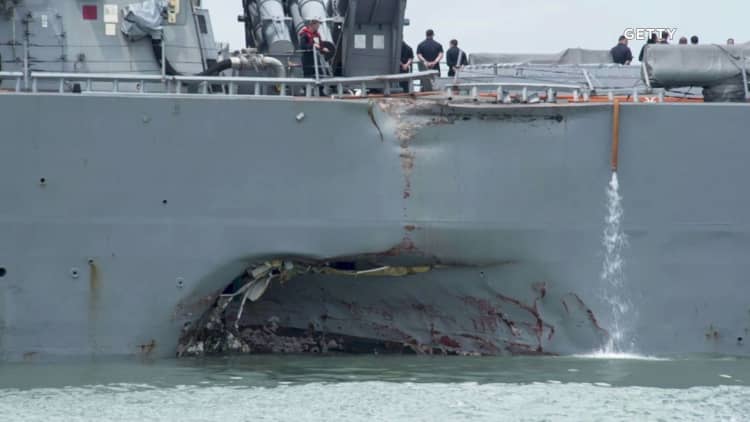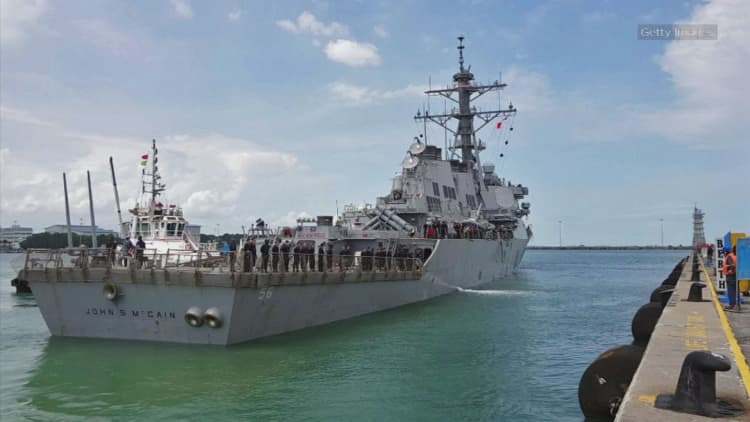A Senate hearing Tuesday looking at recent deadly U.S. warship accidents turned the spotlight on how "sleep deprivation" may have played a role in the mishaps.
At the same time, some raised questions about streamlined training as potential contributors to the mishaps. Also, some pinned the blame on the lack of stable funding due to sequestration for some of the training and readiness issues involving the Navy.
"We have a problem in the Navy, and we're going to fix it," testified Navy Secretary Richard Spencer.
At the Senate Armed Services Committee hearing Tuesday, Navy officials acknowledged a good chunk of the service's cruiser and destroyer fleet crews deployed overseas are not up to date on warfare certification.
The Navy secretary pledged that in addition to the investigations already underway, the Navy is conducting at least two "thorough reviews," including a probe looking at the tactical and operational issues. A second involves a strategic readiness review by an independent panel to look at "root causes, accountability, long-term systemic issues," he added.
Last month, the USS John S. McCain guided-missile destroyer collided with an oil tanker near Singapore, resulting in the death of 10 sailors. In June, the USS Fitzgerald, another destroyer, collided with a cargo vessel off Japan, an accident claiming seven sailors. Prior to that, there also were two nonfatal mishaps involving Navy vessels.
Some family members of sailors who died in the recent accidents attended the Senate hearing.
On Monday, the Navy said it removed two senior officers in the 7th Fleet after the recent operational incidents.
Republican Sen. Roger Wicker asked whether "sleep deprivation" may be part of the problem, noting that the issue was highlighted in articles by The New York Times.
"We're diving into that deeply," responded Chief of Naval Operations Adm. John Richardson.
GOP Sen. John McCain, chairman of the Senate Armed Services Committee, asked Richardson if it was true some sailors were putting in 100-hour workweeks on ships. "I will not deny that," said the admiral. "The sailors are working very hard."

According to Richardson, the Navy's longer workweeks are especially common with sailors on Arleigh-Burke class destroyers. However, he added, "We're starting to respond to that by supplementing the crews."
The two warships involved in recent deadly collisions in the western Pacific were both Arleigh-Burke-class guided-missile destroyer vessels.
"If we know somebody is working a 100-hour workweek, I'm not sure we need a study," said McCain.
The admiral said he expects to have a comprehensive review of the USS John S. McCain and USS Fitzgerald accidents sometime in mid-to-late October. "I want to get these answers now, but I also want to get these answers right."
After the reviews and recommendations from the teams are received, the Navy secretary said he will use his authority to seek to "change processes and acquire any new capabilities in order to protect our people."
"We will take lessons learned from the recent tragic events and come out the other side a stronger, more capable Navy-Marine Corps team," said Spencer. "Make no mistake, we are not waiting 60 days or 90 days to make adjustments. We are not lying idle, and I can tell you, ladies and gentleman, we are committed."
Regardless, McCain pointed to the Budget Control Act and sequestration as sharing some blame for the military's current predicament. He said it's forced the Navy and other armed service branches to "to do more with less, and that has come at the expense of operational effectiveness."
Specifically, the fiscal impacts have resulted in longer deployments of warships and less time for hands-on training and maintenance, McCain said.
"The Navy is caught between an unrelenting operational demand and a limited supply of ships," testified John Pendleton, director of defense capabilities and management at the U.S. Government Accountability Office. "At this point, I'm skeptical that the Navy will be able to make significant readiness gains unless the demands on them are decreased."
The GAO official added that even with increased funding going forward, it will take several years to rebuild training and maintenance. He said those are the "foundations of readiness that have become shaky over time."
He also said previous reports by the GAO have found that the Navy's "aggressive deployment schedules" sometimes lacked "dedicated training periods" like those available in the United States. "We were told that the overseas ships were so busy that they had to train on the margins."
Also, more recent reports from the agency show continued challenges facing the Navy's overseas operations.
As of June 2017, 37 percent of the warfare certifications for cruiser and destroyer crews based in Japan had expired, according to the GAO. Those findings were released in a readiness report released Sept. 7 by the agency.
The admiral agreed that the crew certifications have "dropped precipitously" in the last few years and that it "deserves our full attention."
Democrat Sen. Jack Reed, ranking member of the Senate Armed Services Committee, asked the admiral about any streamlining of training by crews due to deployment schedules and whether it may have contributed to the recent accidents because "these young people were hustled through" and not given the same training opportunities as predecessors might have been given.
The admiral said it was still "too early" to indicate whether streamlined training played a role but said that's one of the things the investigation is looking at and whether training was sacrificed for operational needs. Also, he said when maintenance periods run longer on ships it might further stress the situation with training.
WATCH: Remains of missing sailors found on USS John S. McCain



